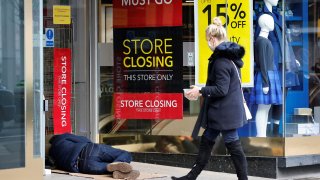
- The coronavirus pandemic triggered unprecedented economic contractions and job losses, exposing and worsening inequality around the world.
- Returning to a healthy economic environment will help alleviate some of those inequities, said David Wilcox of the Peterson Institute for International Economics.
- Richard Yetsenga of ANZ Bank, however, noted that inequality was already a problem before Covid, even when many economies had low unemployment rates.
SINGAPORE — The coronavirus pandemic triggered unprecedented economic contractions and job losses, exposing and worsening inequality around the world.
Global extreme poverty is set to rise for the first time in over 20 years, with Covid-19 forcing millions more to live on less than $1.90 a day, according to the World Bank.
David Wilcox of the Peterson Institute for International Economics said economic downturns in the U.S. tend to be "inequality-exacerbating" and that this recession has "unique characteristics."
He pointed to data which shows that employment rates for high-wage workers have returned to pre-Covid levels. Low-wage employment, however, is still down by nearly 20%.

"A return, not so much to economic growth, but to a healthy economic situation overall will help alleviate the inequalities that have widened sharply this (past) year," Wilcox, a senior fellow at PIIE, told CNBC.
Money Report
"Once a vaccine has been widely administered, people will feel comfortable once again engaging in lots of activities that powered the service economy pre-pandemic," he said. That includes going to the gym, eating in restaurants, flying on planes and attending conferences.
"All that will help reemploy a lot of the people who have been out of work since mid-March," he said.
But Richard Yetsenga, chief economist of ANZ Bank, said economic growth may not be able to alleviate inequality beyond gains made through job creation.
"More jobs is clearly something that can help inequality in the short term. But, before Covid many economies had quite (even very) low unemployment and yet inequality was already a problem," he said in an email.
"Economic growth didn't solve the equity problem in most economies in the decade before Covid, and so something would need to be different to resolve it afterwards," he added.
In a research note from November, Yetsenga said giant corporations have been the main beneficiaries of global growth over the past two decades. "But median wages have not increased the way we might have expected, and certainly not in a way that was consistent with historical experience," he wrote.
Additionally, it is possible that, given the accelerated rate of digital adoption, inequality could worsen as economies progress.
"The industrial revolution made us much wealthier, but inequality widened dramatically," Yetsenga said. "There are strong similarities with the digital revolution."
IMF researchers found that new technologies such as artificial intelligence and robotics could replace labor from developing countries and widen the gap between rich and poor countries.
Possible solutions
Yetsenga said inequality may be the "biggest policy challenge" after Covid, and accepting that it is a problem will be the first step to finding an answer.
The next step is seeing growth and inequality as intertwined, instead of one being the solution to the other.
He said aiming for greater GDP growth may appeal to some as the best way to solve inequality, but that approach is not likely to succeed. "Surely we can't keep striving for one (growth) and keep expecting the other (inequality) to magically resolve itself?"
The PIIE's Wilcox said, beyond a healthy economy, countries could revamp their tax systems to be more progressive or invest in an equitable education system in the long run.
"We can take advantage of historically low interest rates to undertake government investment in smart, targeted ways that not only employ lots of people but also meet other important social objectives," he added.
A Brookings Institution article also said that policies must keep pace with technological advancements so that economic growth can be inclusive.
"Is rising inequality an inevitable consequence of today's technology-driven economic transformations—and globalization? The answer is no," wrote Zia Qureshi, a visiting fellow at Brookings' global economy and development program.
"With better, more responsive policies, more inclusive economic outcomes are possible," he said.






